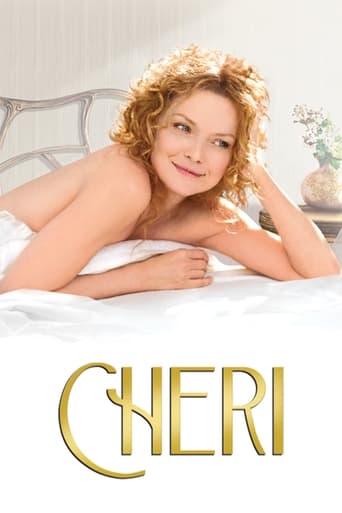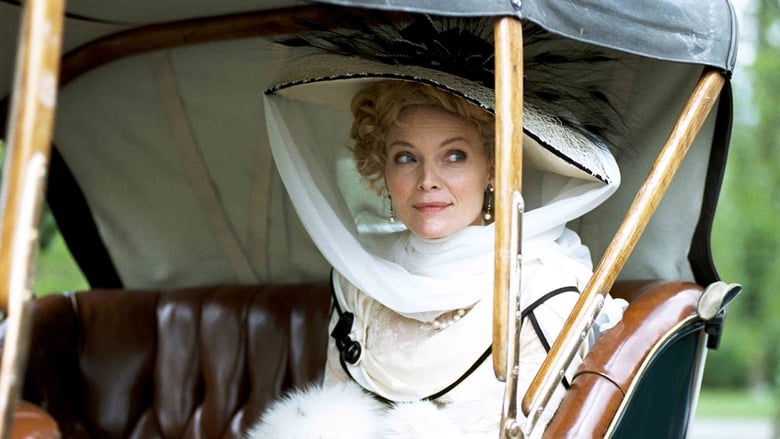

 Watch Now
Watch Now




Chéri (2009)
 Watch Now
Watch Now




The son of a courtesan retreats into a fantasy world after being forced to end his relationship with the older woman who educated him in the ways of love.
Watch Trailer
Cast


Reviews
I don't have all the words right now but this film is a work of art.
Good films always raise compelling questions, whether the format is fiction or documentary fact.
The movie's neither hopeful in contrived ways, nor hopeless in different contrived ways. Somehow it manages to be wonderful
The film never slows down or bores, plunging from one harrowing sequence to the next.
A film that fails to ignite much interest. Not for the first time in recent memory Pfeiffer plays the older woman in love with a younger man, in this case one much younger. Scorsese and Pfeiffer covered some of this same territory in The Age of Innocence, and to much better effect. She is a courtesan, he the son of another famous courtesan. He has led an indolent life, spoiled throughout his entire existence. As a result he has grown to manhood completely divorced from any feelings for anyone. Instead he allows himself to be forced into a hastily arranged marriage by his ambitious mother, to a young woman he neither loves nor cares for. He is indifferent to his wife and drifts back and forth between the two women.The script is pretty nondescript in places. Pfeiffer has a few decent lines and still radiates enough screen presence to carry some scenes, and Bates matches her well. Most of the problems with this film are based on the male character Cheri (Friend). He is left with too little too late for us to care about his fate. lnstead he allows himself to have his opinions formed for him by his mother and and Lea who also does much of what passes for thinking on his behalf as well. He is married off to a woman he doesn't love, and then proceeds to drift between her and his lover without ever showing any real sense of commitment to either. Due to the limitations of the script and his character, he comes across as only half formed, and too many scenes end with him staring blankly into the camera, looking quite vacuous, and a penny for his thoughts would be an understatement of inflation. lt is not easy to know which audience this movie is aimed at. It is not quite glamorous enough to be mainstream nor is it memorable enough to be art-house. As a result it meanders along without ever really being anything more than an exercise in self indulgence. That is a pity as l was expecting a fair bit more from those involved.
The most positive aspect of this movie is the meticulous evocation of the social environment of the French and international jet-set residing in Paris during the beginning of the 20nth century in the "golden", at least for some, years of the 3rd French Republic, which after the horrors of the 1st World War was named "Belle Epoque". Those rich people had also potent sexual needs for which a specialized class of women was called to cater for, a sort of elevated form of prostitutes, similar to the "heterai" of ancient Athens, enjoying riches and high-life but also excluded from respectable society, known also as "demi-mondaines", in the sense that they neither low enough to be part of the underworld neither good enough for normal society.One of them Lea de Lonval, played by Michelle Pfeiffer has aged for the standards of that age and her profession, when a former colleague and antagonist, requests her help to train her 19 year-old son, not even an adult but the criteria of early 20nth century, in the ways of the world and of love, in order to save him from his spendthrift and promiscuous life, guiding him through her expert hands.Unfortunately this temporary solution, that was going to be superseded by an arranged marriage for the boy, develops to a deep love which eventually brings tragedy to the couple.A study of perhaps outgrown social conventions of a bygone age and of a social environment which is rich but rife with antagonism and resentment, this movie based on two novels by the acclaimed and controversial French author Collete, is a fine evocation of a charming but flawed world, which may be found wanting in moral fibre by Anglosaxon Protestant moral criteria.Regardless of the personal opinion one may have about the people portrayed in this film, it is true that they are very ably presented both in their emotional profile as well as in their material surroundings. The mental picture of this era that I have coincides with what I saw in this film, although I have not read the novels themselves to judge if the movie is loyal to their letter;I guess it is loyal to their spirit.The negative aspects of the movie are the rather vulgar voice of the narrator who speaks in a tone, as if in a TV show concerned with the sexual escapades of modern Hollywood celebrities. Not that the "demi-mondaines" of the Third Republic were morally better than modern Hollywood celebrities, but the passing of time has let an aura to them, destroyed by the intrusion of the annoying voice of the narrator.The other point is that the language of the movie is English, while it describes an environment who spoke French, given that the international language of the rich was still French, at least of those residing in Paris, in early 2Onth century, that is before the USA had totally eclipsed Old Europe in the world stage.But those details are minor and you should watch this film, to savour the beautiful costumes, rich interiors, fine landscapes and all those elements that were unable to offer true happiness to the protagonists given that social convention barred their love from flourishing.
While I thought the idea of the movie interesting--a May/December romance with Lea, played by Michelle Pfeiffer, being much older--it was distasteful that Michelle's character was like an aunt to the nineteen-year-old Cheri, played by Rupert Friend. There was a hint that Cheri's mother, Kathy Bates (who I always love), wanted the affair to occur to keep Cheri out of trouble. That seemed a bit creepy. As for the romance, there was no chemistry between Lea and Cheri, and no character development for Cheri, even though the movie was named for him. He remained sullen, brooding, immature and amazingly dull, although I don't blame Rupert Friend for the performance. I think the script, direction and editing were to blame, if not the story itself. The love scenes were tasteful but not believable. The pair were together for six years, but the relationship didn't seem to have love or even lust at its core, just a boredom being filled with champagne and satin sheets. Michelle was the reason my rating was a 3 rather than a 1. She did a good job with what she had to work with and I was invested in her character. However, the character was ultimately a disappointment. I think we were supposed to come away with an experience of a slice of French culture (courtesans) during La Belle Epoque, but it didn't work. I was stunned to see a car pull up to a country house; it seemed out of place. The director had no idea how to set the time and place properly. The overlong verbal narration at the beginning and end of the movie was not only annoying (I hate being told what should be shown) but it didn't tell us things helpful to the story. The voice-over at the end was particularly awful because Cheri's entire life's arc was given three sentences. If they had edited that out, I may have been able to nudge my rating to a 5.
Stephen Frears has created some powerful and very well crafted movies: 'Dangerous Liaisons', 'My Beautiful Laundrette', 'The Grifters', 'The Queen', 'Prick up your Ears', 'Dirty Pretty Things', etc. One would expect that his experience in dealing with edgy issues would make him the perfect choice for adapting the famous French writer of 'naughty novels' - Colette - but somewhere in the flow of this production, perhaps in the Christopher Hampton's adaptation of the novel to screenplay, the original stories become perfumed and sanitized. And the reasons why this happened remain obscure. The story is simple: courtesans in Paris must eventually retire form their lives of becoming wealthy through pleasing men of the higher class, and either they live out their lives in the luxuries of fluff or they must confront their aging and feel pangs of remorse as they end their lives alone, without a man to bolster them. Lea de Lonval (Michelle Pfeiffer) has been longtime 'friends' with Madame Peloux (Kathy Bates), even to the point of nurturing Madame's son Chéri (Rupert Friend) as he approaches manhood. Madame asks Lea to 'polish' Chéri for other women and after what might have been a brief fling in Normandy, the young Chéri and the aging Lea fall into a six year relationship. But as Madame realizes she needs grandchildren, she eventually finds a proper girl Edmee (Felicity Jones) for Chéri to marry. The remainder of the story is how these two age-disparate characters adapt to the 'social rules' of La Belle Epoque, suggesting that even under extraordinary circumstances the power of love is an issue that must be confronted. Despite the performances by Pfeiffer and Friend (and even the miscast Bates) the story feels somehow sterile. Perhaps it is the out of place use of a male narrator who gives the film an unnecessary feeling of being a documentary, or the somewhat overused musical score of Alexandre Desplat, or the emphasis on costumes that hardly add to the beauty of Pfeiffer as Lea that keep the production grounded. It is a pleasant enough film, but hardly a memorable one. Grady Harp




